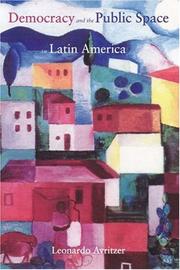| Listing 1 - 1 of 1 |
Sort by
|

ISBN: 0691090874 0691090882 1282935275 9786612935275 9786612087561 1400825016 1282087568 1400814154 9781400814152 9781400825011 9781282087569 9781282935273 9780691090870 9780691090887 Year: 2002 Publisher: Princeton, N.J. Princeton University Press
Abstract | Keywords | Export | Availability | Bookmark
 Loading...
Loading...Choose an application
- Reference Manager
- EndNote
- RefWorks (Direct export to RefWorks)
This is a bold new study of the recent emergence of democracy in Latin America. Leonardo Avritzer shows that traditional theories of democratization fall short in explaining this phenomenon. Scholars have long held that the postwar stability of Western Europe reveals that restricted democracy, or "democratic elitism," is the only realistic way to guard against forces such as the mass mobilizations that toppled European democracies after World War I. Avritzer challenges this view. Drawing on the ideas of Jürgen Habermas, he argues that democracy can be far more inclusive and can rely on a sphere of autonomous association and argument by citizens. He makes this argument by showing that democratic collective action has opened up a new "public space" for popular participation in Latin American politics. Unlike many theorists, Avritzer builds his case empirically. He looks at human rights movements in Argentina and Brazil, neighborhood associations in Brazil and Mexico, and election-monitoring initiatives in Mexico. Contending that such participation has not gone far enough, he proposes a way to involve citizens even more directly in policy decisions. For example, he points to experiments in "participatory budgeting" in two Brazilian cities. Ultimately, the concept of such a space beyond the reach of state administration fosters a broader view of democratic possibility, of the cultural transformation that spurred it, and of the tensions that persist, in a region where democracy is both new and different from the Old World models.
Democracy --- Collective behavior --- Political culture --- Political participation --- Démocratie --- Comportement collectif --- Culture politique --- Participation politique --- Political aspects --- Aspect politique --- #SBIB:328H32 --- #SBIB:324H20 --- Behavior, Collective --- Crowd behavior --- Crowds --- Mass behavior --- Human behavior --- Social action --- Social psychology --- Instellingen en beleid: Midden en Latijns-Amerika --- Politologie: theorieën (democratie, comparatieve studieën….) --- Psychology --- Démocratie
| Listing 1 - 1 of 1 |
Sort by
|

 Search
Search Feedback
Feedback About
About Help
Help News
News